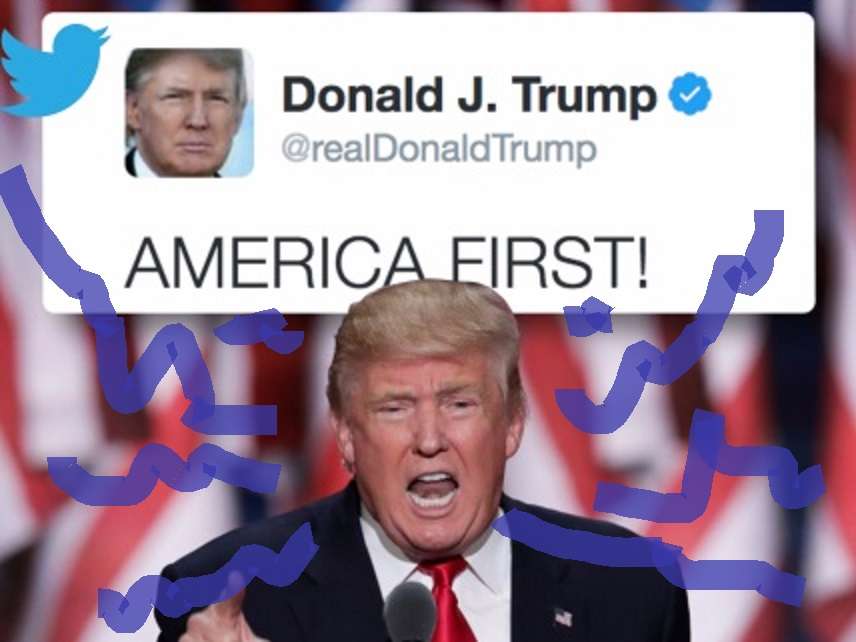Meet the New Boss: Donald Trump, Who Wants To Tell You What You Can Buy and Sell
Via trade and immigration restrictions, the president is completing the GOP's conversion to the party of economic micro-management.

I'm old enough to remember when the Republican Party claimed to be the party of free trade and free markets. So are you, if you can recall any year prior to 2016.
To be sure, the GOP's commitment to laissez faire was always more aspirational than actual, but Republicans and high-profile conservatives aren't even faking it anymore. When it comes to defending and promoting basic capitalist ideas such as free trade, allowing workers to move and employers to hire them freely, and ending subsidies that distort market forces while paying off politically connected interests, Trump-era Republicans and conservatives are all wet.
Over the weekend, the president displayed his ignorance about what matters in trade with this statement bemoaning all the cheap imports Americans have chosen to buy when given the opportunity.
When you're almost 800 Billion Dollars a year down on Trade, you can't lose a Trade War! The U.S. has been ripped off by other countries for years on Trade, time to get smart!
— Donald J. Trump (@realDonaldTrump) June 2, 2018
As Michigan Rep. Justin Amash, the rare Republican who routinely voices disagreement with the president, countered, "I'm way down on trade with restaurants, grocery stores, malls, and movie theaters. I keep buying from them, but they never buy from me. I must be getting ripped off, right?"
Amash is a lonely voice on the right side of the aisle. Here's Fox News' Laura Ingraham weighing into the "Koch brothers" like some ThinkProgress intern with half-a-semester of Econ 101 under his belt (disclosure: David Koch is a trustee of Reason Foundation, the nonprofit that publishes this website, and we are the recipient of grants from the Charles Koch Institute). The brothers' sin? A principled commitment to free trade that puts them sideways with President Trump. Here's how Ingraham responded to reports with headlines such as "Kochs to Spend Millions Fighting Against Trump's Trade-War Agenda."
Of course Koch Brothers "will spend millions" fighting tariffs. Status quo globalist trade imbalance worked great for super rich, not great for the middle class. @realDonaldTrump stand firm.
— Laura Ingraham (@IngrahamAngle) June 4, 2018
As The Washington Post's Catherine Rampell writes, Trump has been trying to "strong-arm the invisible hand" since before he officially took office (remember that air-conditioning plant in Indiana?). Reason's Ronald Bailey has reported on the president's most-recent attack on basic laws of supply and demand, which involves forcing power utilities to buy energy from money-losing coal and nuclear-energy companies. That's the very definition of cronyism, argues Bailey. Rampell notes that, too, while zeroing in on the bogus "national-security" motivation behind related "buy American" rhetoric and policy coming from the White House and tariffs that take aim at such deadly foreign enemies as Canada, the European Union, and Mexico. Then there's the bully pulpit, which this president has weaponized against specific companies whenever he wants:
He urged National Football League teams to "fire or suspend" players who kneel during the national anthem, comments that at least one team owner admitted in a deposition affected his personnel policy.
He attacked Nordstrom for dropping his daughter's clothing line.
He publicly berates Amazon—whose chief executive, Jeffrey P. Bezos, independently owns The Post—and has reportedly demanded that the Postal Service double prices on Amazon packages.
Rampell suggests that Trump's willingness to break "a sacred data embargo" on jobs-report numbers also illustrates his willingness to game markets unfairly. Whether you buy that or not, there's little doubt that the president's constant attacks on the media and his own government's analysis "has eroded confidence in the integrity of government data and fairness of financial markets."
Of course, that erosion started long before Trump and will likely continue long after he's moseyed to whatever pasture he ends up in. Indeed, if Salena Zito and Brad Todd, authors of The Great Revolt: Inside the Populist Coalition Reshaping America Politics, are correct, Trump is an effect of such a breakdown in confidence and integrity, not a primary cause. As Zito recently told me, in many cases, the same folks who voted for Trump in 2016 had voted for Barack Obama because they had lost faith in the ability or willingness of more-conventional candidates to represent their concerns. What isn't up for discussion is that Trump has changed the Republican Party position on trade:

Democrats' new faith in the power of free markets may be situational, but there's no reason to doubt that Republicans have definitively shifted on the matter. Even before Trump was elected, upwards of 85 percent of Republicans were saying that free trade had cost more jobs than it created. Add to that growing hostility to immigration among conservatives and GOP lawmakers who want to cut legal immigration in half while keeping tight caps on work visas for skilled and unskilled workers alike. Back in the days of Ronald Reagan and George H.W. Bush, such restrictions would have been seen for what they plainly are: sure-to-fail attempts by the government to dictate and control labor markets.
Which is of a piece with the way Trump and the contemporary GOP see their role not as facilitators of free and open markets, but as technocrats who get to decide more and more of what goes on in the economy. It wasn't a good look when Democrats used to talk about the need for tighter and tighter regulation and more "consensus" on who gets to make what or hire whom. And it sure as hell isn't any prettier when it's Donald Trump, ostensibly flanked by gone-missing party leaders Mitch McConnell and Paul Ryan, barking out orders.


Show Comments (151)